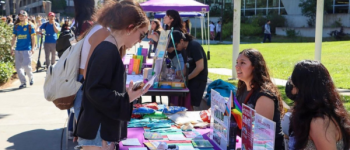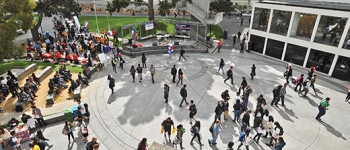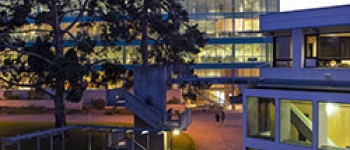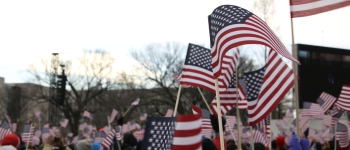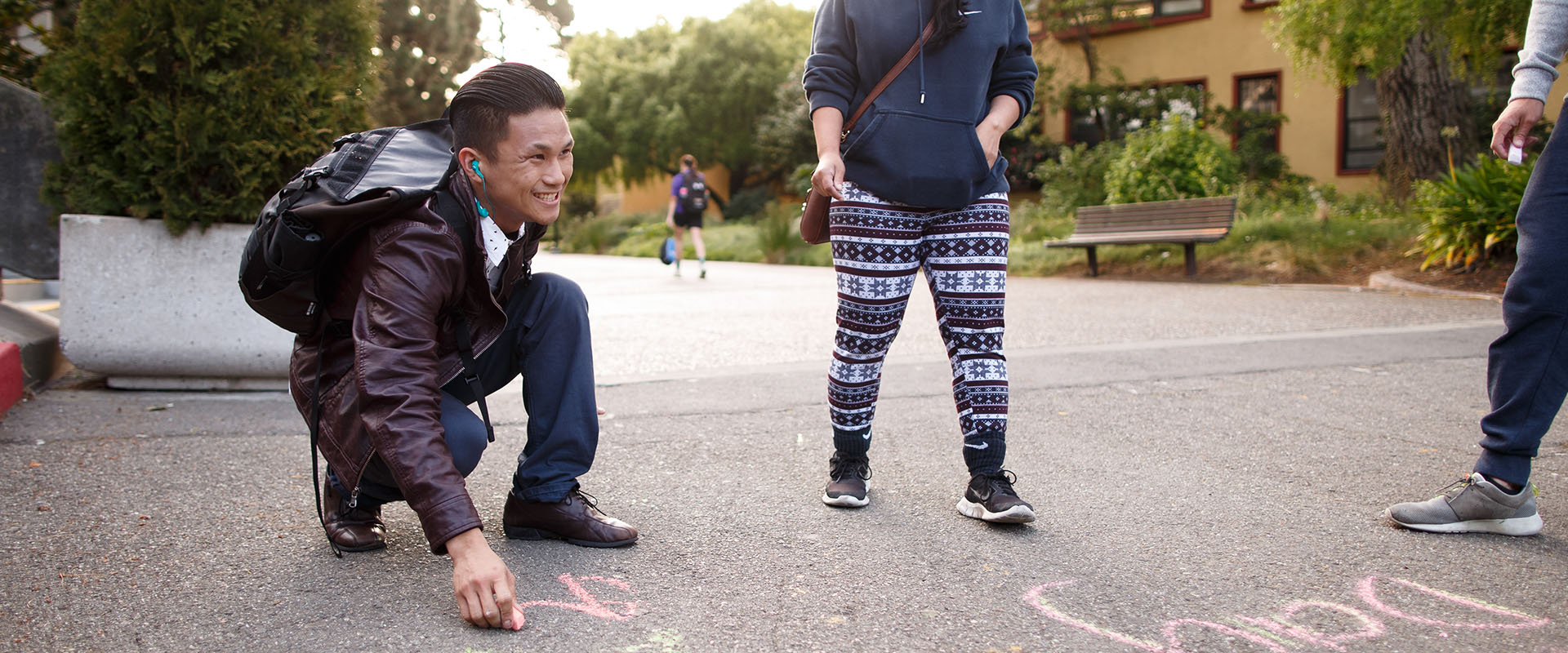Freedom of Speech | The First Amendment at SF State
San Francisco State University is dedicated to fostering an environment that promotes the free exchange of ideas, viewpoints, and various forms of expression. We are committed to an educational mission that protects the rights of all to learn, teach, and conduct research free from censorship. While these principles are essential to a university’s mission, they can sometimes lead to disagreements, frustration, and confusion, especially when the viewpoints expressed are not shared by all or seem to conflict with the university's values. The purpose of this webpage is to provide additional context for when such instances on campus occur and to highlight San Francisco State University's commitment to safeguarding diverse forms of speech, even when it might provoke feelings of discomfort, anger, or sadness. It is important to know that the protection of freedom of expression and diverse viewpoints is also a legally protected right in the United States.
Typically, SF State is a place of celebration, filled with learning, laughter, art, music, and meaningful connections. There are occasions, though, when programs and events, discussions and opinions evolve into heated debates or deepen ideological disputes. It is highly likely that you will encounter viewpoints that you disagree with or that are deeply unsettling and spark conflict, leading to frustration, hurt, or even existential fears. Sometimes our necessary support for freedom of expression and academic freedom will not make our equal commitment to inclusion and belonging easy. But we must balance these commitments by protecting rights to free speech and providing supportive measures for those for whom this speech is wounding or even emotionally threatening.
When campus speakers or events cause conflict, discomfort, or pain arrive, please know that there are many campus offices ready to support you. Every member of our campus community has access to the help they need during difficult times. San Francisco State University offers resources, support services, and community for those seeking compassion, inclusion, and understanding.
-The First Amendment, Constitution of the United States
-State of California Constitution
Frequently Asked Questions (FAQ)
There are five freedoms in the First Amendment of the United States Constitution:
- freedom of religion
- freedom of speech
- freedom of the press
- freedom of assembly
- freedom of petition
While these freedoms appear absolute, they are not. For example, we have the freedom of assembly but that does not mean we can assemble to block people from entering a polling place to exercise their right to vote. Neither does the right to freedom of expression protect direct threats of physical violence. Broadly speaking, on a university campus, the exercise of these rights cannot become an obstacle to campus operations, in particular, it cannot impede on the instruction and student learning
In the United States, freedom of speech is strongly protected by the First Amendment of the U.S. Constitution, as well as many state and federal laws. The United States’ free speech protections are among the strongest of any democracy; the First Amendment protects even speech that many would see as offensive, hateful or harassing.
Freedom of speech on a public university is the constitutional right of individuals to articulate opinions and ideas without interference or retaliation. The term “speech” constitutes expression that includes far more than just words, but also what a person wears, reads, performs, protests and more. This speech is protected by the First Amendment of the Constitution. Public universities are held to the highest standards for freedom of expression, resulting in confusion about why speech that many may disagree with is allowed.
SFSU is a public-funded University. The Supreme Court has ruled that the First Amendment protects students and teachers in public schools. In the landmark case of Tinker v. Des Moines, the Supreme Court explained, "It can hardly be argued that either students or teachers shed their constitutional rights to freedom of speech or expression at the schoolhouse gate. This has been the unmistakable holding of this Court for almost 50 years."
The Court did, however, note that the First Amendment rights of students are not absolute, "conduct by the student, in class or out of it, which for any reason-whether it stems from time, place, or type of behavior-materially disrupts classwork or involves substantial disorder or invasion of the rights of others is, of course, not immunized by the constitutional guarantee of freedom of speech."
SFSU is committed to making all efforts to preserve both freedom of speech and the many other rights in the Constitution that are guaranteed to members of the campus community.
Because SFSU is a public university, members of the greater community (non-SFSU guests or visitors) are also protected under the First Amendment. Their speech and activity, on campus property (this does not apply to in academic buildings), fall under the U.S. Constitution.
Yes, there are limitations. Some speech is not protected by the First Amendment, such as speech that directly and immediately incites violence or meets the legal definition of harassment. The CSU has the right to place reasonable restrictions on the time, place, and manner of speech to ensure the orderly operations of the campus and to ensure that all voices and viewpoints enjoy the same rights. Public universities have policies to balance free speech with maintaining a safe and conducive learning environment. At SF State, this falls under the Time, Place & Manner (TPM) policy. It is important to know that the TPM policy and processes are designed to protect and support speech by providing rules that allow all to be heard and that ensure that teaching and learning are not disrupted.
Generally, yes. SF State students and employees and campus visitors are all subject to the TPM policy. Under the Time, Place & Manner (TPM) policy and noting that SFSU is a state-funded public institution, anyone who engages in public speech cannot have their First Amendment rights violated unless it disrupts the orderly operations of the campus. If guests/visitors come to campus and their speech disrupts regular University business/operations, violates TPM policy, or disrupts another program previously scheduled and approved by the University may be asked to relocate or leave. This is true for students and employees, as well.
The Constitution prohibits any public institution from banning or punishing speech based on its content or viewpoint. The university cannot take away that right or withdraw those resources based on the views of the invited speaker. In addition, SFSU cannot make decisions about which events to allow or not based on content. Doing so would violate the First Amendment rights of the student group. This is true for any speaker invited by any campus entity.
But these rights are not absolute. Instances in which an event might be cancelled are described below in the "Which types of speech are not protected by the First Amendment?" section.
The Constitution guarantees freedom of speech. The university cannot stop speech before it occurs based on the belief that it may not be protected speech.
When it comes to speakers delivering remarks on campus, some of the relevant exceptions to the First Amendment that have been established are:
Speech that would be deemed a “true threat”: Speech that a person reasonably would perceive as an immediate threat to their physical safety is not protected by the First Amendment. For example, if a demonstrator yelled at an individual student or group of students and threatened physical assault, then such speech would likely not be protected.
Incitement of illegal activity: There is no right to incite people to break the law, including to commit imminent acts of violence. To constitute incitement, the Supreme Court has said that there must be a substantial likelihood of imminent illegal activity and the speech must be directed to causing imminent illegal activity. For example, a speaker on campus who exhorts the audience to immediately exit the room and engage in acts of vandalism and destruction of property on campus is likely not protected by the First Amendment.
Harassment: In the university setting, speech that is directed at an individual is not protected when it is severe, pervasive and objectively offensive, and undermines the student’s ability to participate in the educational experience. Speech that contributes to a broader pattern of harassment resulting in a "hostile or offensive environment" for an individual because of that person’s protected characteristics/status is also not protected by the First Amendment. For example, posting racist messages on the dorm room of an African American student would likely be regarded as harassment and not speech protected by the First Amendment.
Free speech rights also extend to online and social media activities of students and employees. University-provided online forums follow the same general principles as physical forums.
No, freedom of speech is not absolute on public university campuses. It is subject to reasonable restrictions to ensure the safety and educational mission of the institution and the legal limits of the First Amendment. Please refer to previous FAQs for more information.
It's important to note that the specific policies and practices regarding freedom of speech can vary among public universities, so it's a good idea to consult your university's policies for the most accurate information.
No, this would violate established law and the rights of student groups to invite whoever they wish to the SFSU campus. Only student groups who invite speakers have the authority to disinvite them. This would apply to non-student-sponsored events as well. However, as with all speakers and events, they may impose reasonable time, place, and manner restrictions to ensure safety and order. And, as covered in these FAQs, speakers and events may be moved or canceled under very specific circumstances that include disruptions of campus operations and imminent and direct threats of violence.
The Supreme Court has made it clear that a public institution like SFSU cannot prevent speech on the grounds that it is likely to provoke a hostile response. Stopping speech before it occurs is called a “prior restraint,” and prior restraints of speech are almost never allowed. Groups inviting speakers to campus and hosting events must comply with TPM policy and do their part to ensure safe events.
While the campus is constitutionally required and committed to doing what it can to protect speakers and to prevent disruption or violence, if despite all efforts by the campus there is an imminent threat to public safety and no other alternative, a speaker’s event can be cancelled. This is a last resort and never done based on the views of the speaker. The campus’s paramount need is to protect the safety of its students, staff, and faculty.
The term “hate speech” does not have a legal definition in the United States. It is often used to refer to speech that insults or demeans a person or group of people on the basis of attributes such as race, religion, ethnic origin, sexual orientation, disability or gender. The Supreme Court has explicitly held that prohibitions or punishments for hateful speech violate the First Amendment. In short there is no right to be free from hearing offensive speech.
Just because there is a First Amendment right to say something, however, doesn’t mean that it should be said. The First Amendment protects a right to say hateful things, but as a campus we strive to be a community where no one will choose to express hate. We also offer a variety of support resources for those deeply wounded or made fearful by others’ expressions.
In general, harassment requires that speech be the following:
- Specifically targeted at a student or group of students
- Repeated
- Intimidating or threatening
Further, the harassment speech generally must demonstrate harm to a student, damage to a student's property, interfere with the student's education, or disrupt the orderly operation of the University.
San Francisco State University is committed to creating a campus environment free of harassment and encourages health debate and the exchange of ideas to promote a diverse learning environment.
If you believe you have experienced discrimination, harassment, or retaliation, please review the resources from Title IX / Equity Programs & Compliance Office at: https://titleix.sfsu.edu/reporting
The Supreme Court has said that public entities like SFSU have discretion in regulating the “time, place, and manner” of speech. The right to speak on campus is not a right to speak any time, at any place and in any manner that a person wishes. The campus can regulate where, when and how speech occurs to ensure the functioning of the campus and achieve important goals, such as protecting public safety.
When working with student groups to schedule events, SFSU invokes this necessary authority in order to ensure that hold events are held at a time and location that is appropriate for the type of the event and that does not disrupt the other business of the university. Various campus offices can be involved in these decisions, including Academic Affairs, Student Affairs, Facilities, and the University Police Department For example, an event likely to draw a significant crowd, including protesters or counter-protesters, factors such as room capacity, number and location of emergency exits, availability of campus personnel to assist with the event, location in relation to existing classes or other campus events may be considered in determining the best time and location for the event.
Because of the significant planning that goes into ensuring an event is held safely and is not disrupted we require students, university employees, organized groups, and community members to work with the administration in advance when setting up their events, as opposed to scheduling and creating the events on their own without campus input.
SF State’s mission rests upon freedom of expression and academic freedom. We believe the premise that we are all better off if ideas and perspectives can be expressed and responded to, rather than be subject to an imposed orthodoxy of belief and punished for deviating from it.
As a community of educators, free speech is important to CSU’s mission of teaching and learning. Many ideas now fundamental to our understanding of the universe and our place in it – such as evolution or climate change – were initially attacked. Freedom of speech is so important to the university that one of the university’s other bedrock principles is academic freedom, which protects faculty in their research and teaching, as well as the speech of students.
While there are not designated free speech zones, certain areas of campus are considered public, limited public, and non-public spaces. Thus, some are more conducive to free speech activities than others, as speech cannot disrupt campus operations, particularly instruction and student learning. For this reason, there are greater restrictions on speech inside university offices or classrooms and fewer restrictions on areas more generally accessible to the public, such as courtyards/quads, plazas and sidewalks.
Yes, students have the right to engage in peaceful protests and demonstrations on campus, as long as they do not disrupt campus operations, impose safety risks, or inhibit the rights of others to exercise free speech.
Students who believe their free speech rights are violated can file complaints with the campus. Students should coordinate with The Dean/Associated Vice President of Students to report their concerns with the University.
If you believe you have witnessed or experienced a violation of the University's policies or the Student Code of Conduct, the Office of Student Conduct provides resources to concerns, provide advice, and guidance to answer questions, discuss questions, and formally report concerns.
If you have experienced discrimination or harassment, you should report your experience to the Office of Equity Programs & Compliance.
Discrimination of an individual or class of individuals articulated in the State of California, federal, and San Francisco State University laws, rules, regulations, procedures, and executive orders is prohibited based upon:
- Race
- National origin
- Ethnicity
- Age
- Pregnancy
- Religion
- Physical or mental disability
- Color
- Ancestry
- Gender (including sexual harassment)
- Marital status
- Sexual orientation (actual or perceived)
- Medical condition
- Military service

